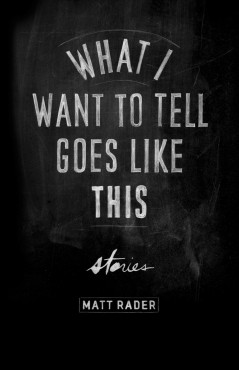
Provided (graphic)
Matt Rader’s debut short story collection, What I Want to Tell Goes Like This, reveals the ways in which the past continues to influence our understanding of the present through the pairing of historical and contemporary stories with shared Vancouver Island locales.
“History has been a theme in my literary practice for a long time,” Rader said in a phone interview with the Martlet. “My hypothesis is that history is the story we tell ourselves about the past now. So whatever we’re saying about the past now and how we say it is really about activating some identity in the present.”
Many of the stories in Rader’s collection occur in the Comox Valley during the 1900s and make use of real events and people from those times, but according to Rader, this collection is not about recording history. “I’m not a historian,” Rader said, “but I was interested in the ways in which those stories from history activated my imagination and my perception of contemporary life.”
The past’s influence on our perception of the present comes through strongly in Rader’s collection; however, the stories transcend this historical commentary. Due to the language and lucidity with which time and space are regarded in the collection, Rader’s stories have a uniquely human core.
“I think a problem that a lot of artists and writers have is that we experience the world in symbolic code all the time, almost before you actually experience the thing itself, and I suspect that this is part of why the stories are temporally idiosyncratic,” Rader explained.
The idiosyncratic use of chronology, particularly in “Wejack,” works to both captivate readers and to create an authentic sense of how we experience our personal histories. In the end, this seemingly jumbled form provides more clarity through the intentionality of the sentence-to-sentence language.
“I have a hard time thinking about the bigger narrative,” Rader admitted. “I’m composing sentence by sentence, which maybe explains why some of my stories have almost no plot.” This focus on the sentence-by-sentence texture of the prose is probably the biggest influence that writing poetry has had on Rader’s experience with fiction.
“Poets expect readers to read language more closely than prose writers do, in general,” said Rader. “For poets, accent and rhythm and repeated words can carry a lot of meaning. I suspect that in the stories I’m paying a little bit more attention to that than I would if I was coming at it from a novelistic point of view.”
This focus on language is among the greatest delights of reading What I Want to Tell Goes Like This. The first paragraph of each story has an instant hook for all lovers of language and the cadence of the prose works to create a subtle and delectable tension throughout the pieces.
Some personal favourites from this collection include “You Have to Think of Me What You Think of Me,” which pairs themes of shame and embarrassment with a poetic understanding of self, “The Children of the Great Strike,” which delves deeply into the miner’s strike on Vancouver Island from 1912-1914, and “Brighton, Where Are You?,” which reveals the odd ways in which the past can be pulled into the present.
Though the concrete and evocative prose feels effortless, the writing process was a great challenge for Rader. “I think [the stories] were all challenging and I’m not entirely sure any of them are to my satisfaction,” Rader admitted. “They’re just the best I could [do] and my experience is that at some point you need to get rid of the work in order to move on.”
What I Want to Tell Goes Like This, is available now, and Rader will be reading from the collection at Bolen Books on Oct. 17th at 7 p.m.
For more information, visit bolen.bc.ca/event/matt-rader/.






